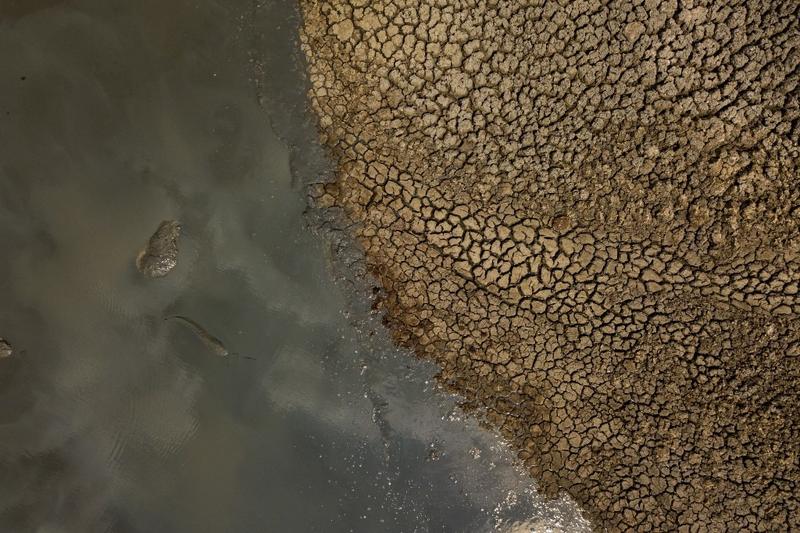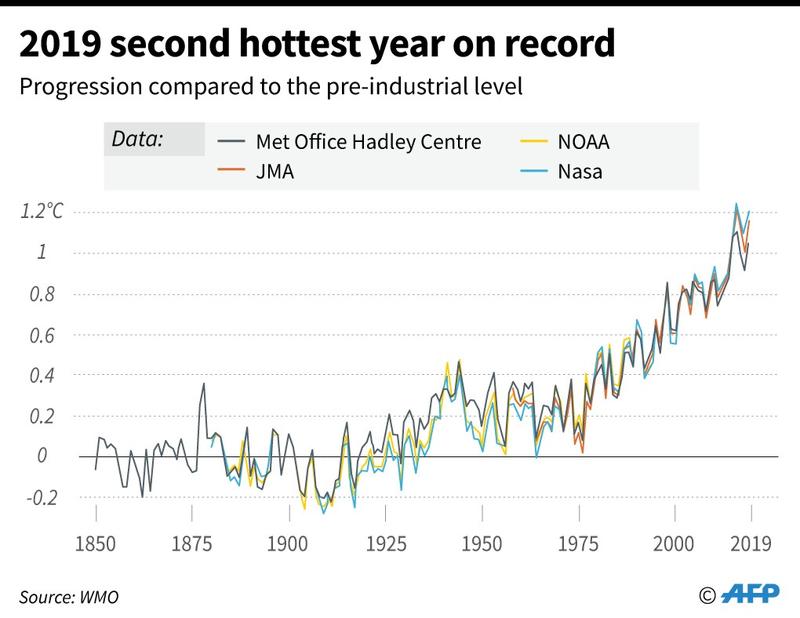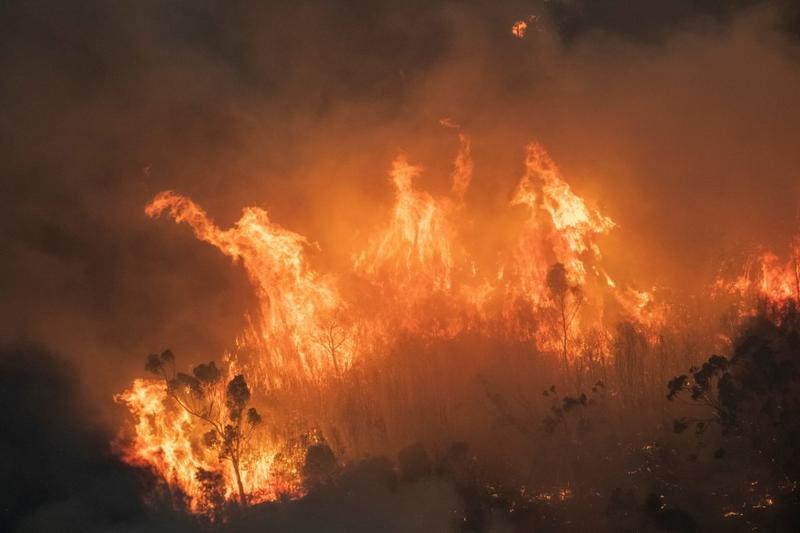 In this Nov 12, 2019 photo, an aerial photograph shows fish flipping in the mud at a drying watering hole in the Hwange National Park, in Zimbabwe. (ZINYANGE AUNTONY / AFP)
In this Nov 12, 2019 photo, an aerial photograph shows fish flipping in the mud at a drying watering hole in the Hwange National Park, in Zimbabwe. (ZINYANGE AUNTONY / AFP)
GENEVA — The year 2019 was the second warmest year on record after 2016, just as the past five years are the top five warmest and the past ten years also the top ten, the World Meteorological Organization (WMO) said on Wednesday, expecting much extreme weather throughout 2020 and the coming decades.
The average global temperature has risen by about 1.1 degrees Celsius since the pre-industrial era and ocean heat content is at a record level. On the current path of carbon dioxide emissions, we are heading towards a temperature increase of three to five degrees Celsius by the end of century.
Petteri Taalas, secretary-general of the World Meteorological Organization
The latest WMO data show that average temperatures for the five-year (2015-2019) and ten-year (2010-2019) periods were the highest on record. Since the 1980s, each decade has been warmer than the previous one, and the trend is expected to continue because of record levels of heat-trapping greenhouse gases in the atmosphere.
The year 2016 remains the warmest year on record, because of the combination of a very strong El Nino event, which has a warming impact, and long-term climate change.
ALSO READ: It's sizzling: Australia experiences hottest day on record
"The average global temperature has risen by about 1.1 degrees Celsius since the pre-industrial era and ocean heat content is at a record level," said WMO Secretary-General Petteri Taalas. "On the current path of carbon dioxide emissions, we are heading towards a temperature increase of three to five degrees Celsius by the end of century."
The rising temperatures have been associated with retreating ice, record sea levels, increasing ocean heat and acidification, and extreme weather during the past year and decade.
 This AFP graphic shows the progression of global mean temperature difference from 1850-2019.
This AFP graphic shows the progression of global mean temperature difference from 1850-2019.
"The year 2020 has started out where 2019 left off -- with high-impact weather and climate-related events," Taalas said, citing 2019 as the hottest, driest year on record in Australia, which has set the scene for the current massive bushfires there.
"Unfortunately, we expect to see much extreme weather throughout 2020 and the coming decades, fueled by record levels of heat-trapping greenhouse gases in the atmosphere," Taalas warned.
Scientists say climate change is likely to have contributed to severe weather in 2019 such as a heatwave in Europe and the hurricane that killed at least 50 people when it barrelled through the Bahamas in September.
Governments agreed at the 2015 Paris Accord to cap fossil fuel emissions enough to limit global warming to 1.5 Celsius above pre-industrial levels - after which global warming is expected to be so severe that it will all but wipe out the world’s coral reefs and most Arctic sea ice.
READ MORE: The planet is burning, but not all hope is lost
 In this handout photo taken and received on Dec 31, 2019 from the State Government of Victoria shows raging bushfires near Bairnsdale in Victoria's East Gippsland region. (HANDOUT / STATE GOVERNMENT OF VICTORIA / AFP)
In this handout photo taken and received on Dec 31, 2019 from the State Government of Victoria shows raging bushfires near Bairnsdale in Victoria's East Gippsland region. (HANDOUT / STATE GOVERNMENT OF VICTORIA / AFP)
However, the WMO has previously said that much greater temperature rises — of 3-5 Celsius — can be expected if nothing is done to stop the rise in harmful emissions, which hit a new record in 2018.
The hottest year on record was 2016, when a recurring weather pattern called El Nino pushed the average surface temperature to 1.2 Celsius above pre-industrial levels, the WMO said.
“In the future we easily can expect warmer El Ninos than the previous ones,” said WMO scientist Omar Baddour. “We can raise a red flag now.”


